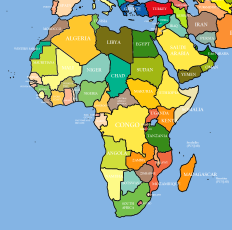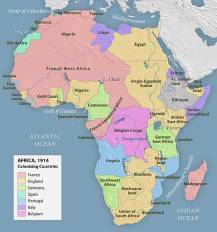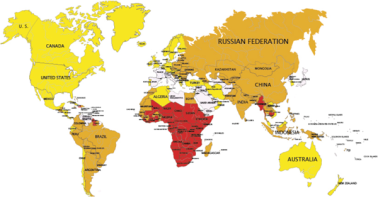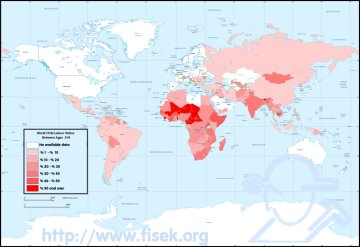I was poking around during a server build and I found this blog post about “Orphans who Aren’t Really in Africa“. My family has been doing business in Africa and Asia for almost 150 years. I have photos of my grandfather and great-grandfather in what is now Kenya and Nigeria in the 1930’s when my grandfather was still a very small boy. I have friends who are Maasai, Lugbara, Shilluk, Batwa, and more. The boundaries they respect have little or nothing to do with the lines drawn on a map, so in that sense, yes, it is Africa and not Keyna, Ethopia, Nigeria, or Tanzania.
In an even deeper sense, it is also Africa because most of the lines you see that carve up the African continent were drawn by Europeans to make administering their new colonies easier. These are artificial western constructs that have shifted somewhat over the years but mostly they have remained the same. The map on the left is current. The map on the right is 100 years old. Notice how little the lines have moved since Europe carved up Africa. These lines had little or nothing to do with pre-European borders. Any of the pre-European “countries” are now lost in the mists of time and genocide.


Africa can’t be considered in bits and pieces like Europe can. The borders are too porous. What happens in one place spills over into everywhere near by. Diseases don’t pause politely at border crossings and wait to be cleared for entry. In places, you can cross four or five countries without ever getting your passport stamped because the “border” is literally just a line on a map. There are no guards, no crossing points, no fences, no walls. There aren’t even any signs. So what happens when the Nigerian military starts chasing Boko Haram – they run over the border into Chad or Cameroon. Why? Because it’s not any harder than it is to drive from Dallas, TX to neighboring Irving, TX. No one stops you. You don’t have to present any travel papers. You just keep going and before long, you’re driving past the mall.
So when I say Africa, I am referring to the entire continent. The whole continent seems jinxed. It doesn’t seem to matter which country it is, but as soon as they start pulling themselves up by the bootstraps, something happens and they devolve into chaos. Chad, Nigeria, Sudan, Kenya, Cameroon, Mozambique, Botswana, Congo, Tanzania, Angola, Egypt, Libya… pick one. If it’s not a disease like AIDS, TB, meningitis, Ebola, malaria, or typhoid then its a civil war. If its not a civil war, its a war of genocide (e.g. Hutu vs Tutsi).
All of these things leave droves of children with no one care for them. I don’t know about where you’re from, but the US hasn’t seen orphanages like ones in Africa in living memory. The US hasn’t had that large a percentage of orphans since the orphan trains of the Civil War era. The sheer number of orphans is somewhat shocking to most westerners. The red color shows places where more than 10% of all children are orphaned. The beige color shows places where 5 to 10% of all children are orphans. Imagine a first grade class room where half of the children have no parents. Note how well this corresponds to the child labor map on right.
While I agree with you that orphans aren’t supposed to be a tourist attraction, I don’t see the harm in this that you do and I see a lot of good that can come from the tourists interacting with these kids. Americans, in particular, are inherently insular. We live in a country where one can drive for 24 hours on paved roads at highway speeds and still have the same food, language and culture. This leads most of us to view the rest of the world as being “just like here”. Unfortunately, being “in poverty” here means you have Cable TV, Internet, a car, and a cell phone so this is the mental image people have of being poor. The reality of it is that “poverty” in large parts of this globe means you are drinking out of an open sewer, eating out of a garbage can and living in a cardboard box that you share with others. For most of these children, being orphaned means that they have to turn to dealing drugs and child prostitution to survive – IF they survive. The vast majority do not. What a great chance to educate the tourists on true poverty and the plight of 0 and 1 parent children in these circumstances. I’m also certain that gifts of clothing and food almost certainly help out the financially strapped orphanages.

